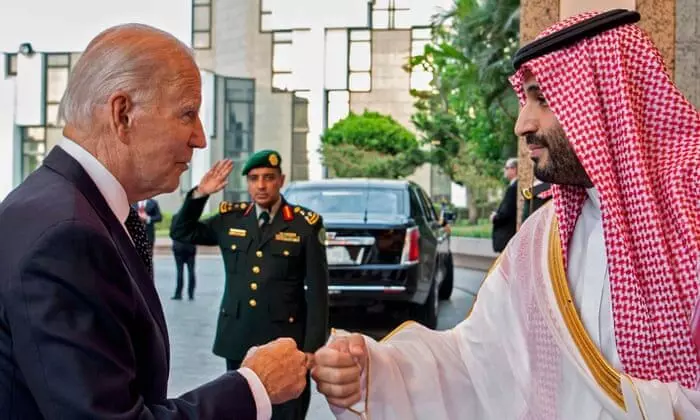
US Democrats impose new ultimatum to Saudi Arabia over oil production
text_fieldsWashington: Saudi Arabia now has weeks to change an Opec+ decision to reduce oil production or face a potential one-year halt on all arms sales, according to a new ultimatum from Democrats in the US Congress.
The threat came as Joe Biden reaffirmed his promise to act in response to Riyadh's decision to reduce oil output by 2 million barrels per day last week, which Democrats have argued will "fuel Vladimir Putin's war machine" and hurt American customers at the petrol pump, the Guardian reported.
Jake Sullivan, the national security advisor at the White House, told reporters that while the US president was considering a potential suspension of arms deliveries as part of a larger examination of the US relationship with Saudi Arabia, no action was imminent.
The outrage at the Saudi action was far more evident on Capitol Hill, as was the demand for rapid and targeted retaliation for what was perceived as a stunning error by a significant partner in the Middle East.
The tensions with Washington and pledge to "rebalance" relations between the two nations might have repercussions that go far beyond petrol prices, including how negotiations over Iran will proceed and how financially strong Moscow will be in its ongoing offensive against Ukraine and even the future of an apparent alliance between Russia and the Saudi heir.
While Democrats discounted the suggestion that Saudi Arabia was trying to sway the outcome of the crucial midterm elections next month in favour of the Republicans, other observers said that Crown Prince Mohammed bin Salman may have been trying to do so.
Democratic senators, on the other hand, emphasised that Prince Mohammed's action benefited Russia and will ultimately hurt all US customers, branding it a brazen betrayal after years of backing from Washington.
"We provide so much not just in weapons, but in defence, cooperation and joint defence initiatives to the Saudis. They get almost 73% of their arms from the United States," said Ro Khanna, a Democratic congressman from California and longtime critic of the kingdom.
"If it weren't for our technicians, their airplanes literally wouldn't fly … we literally are responsible for their entire air force.
"What galls so many of us in Congress is the ingratitude."
The Democratic senator from Connecticut, Richard Blumenthal, who is collaborating with Khanna on the proposal to reduce sales, also brought up broader security issues.
"We are selling highly sensitive technology, advanced technology, to a country that has aligned itself with an adversary – Russia – that is committing terrorist war crimes in Ukraine," he said. "So there's a moral imperative, but also a national security imperative."
He cited sales of air-to-air missiles, upgraded helicopters, jet fighters, radar, and air defence systems, as well as Patriot and anti-missile systems.
"These continued sales pose a national security threat, and I am hopeful that the president will act immediately … and exercise his power on those sales," he said.
In addition, Blumenthal claimed his proposed legislation would operate as a stick to force Riyadh to take action.
"We hope that this legislation will provide an impetus for the Saudis to reconsider this and reverse," he said. "There's still time. The oil supply cuts don't take effect until November."
Blumenthal asserted that the impact of defence budget cuts on US jobs and businesses would be minimal if the Saudis did not change direction.
In a statement published on Twitter late on Wednesday, the Saudi foreign ministry rejected the criticism from Washington and made it clear it would resist requests to change course. It said that all decisions had been made by consensus with other Opec+ countries "based only on economic considerations" and that it had reviewed and rejected claims that it was "taking sides in international conflicts" and that it was "politically motivated against the United States".
The foreign ministry added that it had chosen not to accept a purported US administration request to postpone its action by one month due to economic considerations.
"The kingdom stresses that while it strives to preserve the strength of its relations with all friendly countries, it affirms its rejection of any dictates, actions, or efforts to distort its noble objectives to protect the global economy from oil market volatility," it said.
Any decision by Washington to reduce weapons deliveries would undoubtedly have repercussions among other allies, notably the UK and France, who provide Saudi Arabia with considerable amounts of defence goods.
"There are issues of interoperability, of different weapon systems," Blumenthal said. A freeze in US sales "will have an effect that could be supplemented by decisions by other countries. Certainly. They're impacted by the economic effects of … oil supply cuts. They will make their own decisions … our allies like the UK and France may wish to join."
When Congress reconvenes next month, it is unclear whether the Democrats will be able to enlist enough Republican support to pass legislation, but Blumenthal claimed that he had contacted Republican colleagues who were "receptive" and "favourable in remarks that there need to be consequences" for Saudi Arabia's actions.
The remarks show that, even though his administration will ultimately decide the US policy toward Saudi Arabia, Biden is under intense pressure from congressional allies to go beyond rhetoric and adopt a more strident stance.
In an interview with MSNBC on Wednesday, Robert Menendez, the Democratic chair of the Senate's foreign affairs committee, stated that Saudi Arabia has no choice but to reconsider its Opec+ decision in order to safeguard its security against regional adversaries.
"Who are they going to rely upon to have greater security from Iran, which is an existential threat, than the United States? Russia? Russia's in bed with Iran," he said.
"The bottom line is, Russia is not the bulwark against Iran … they have to understand that their actions have consequences."























